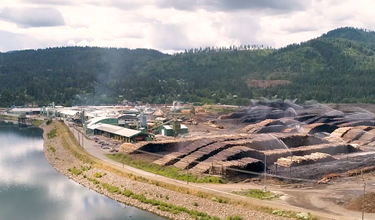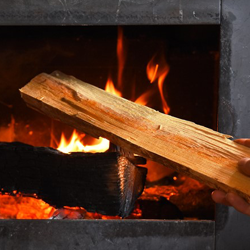
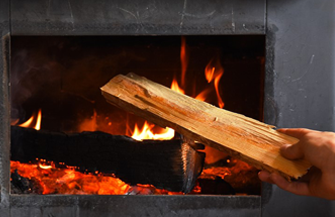
Woodstove Changeout
The City of St. Maries in Idaho has undertaken a multi-party effort to improve local air quality. The area is prone to natural air inversions which can trap particulate matter, which typically consists of combustion products (i.e., smoke). The city of St. Maries is participating in PM Advance, a U.S. Environmental Protection Agency (EPA) program to proactively address air quality improvement opportunities within the St. Maries airshed through voluntary efforts. The Department of Environmental Quality (DEQ), Coeur d’Alene Tribe, and PotlatchDeltic work together with the City to address air quality issues at the local and regional level with pragmatic solutions for the community.
Typically, in communities in mountainous terrain, woodstoves and open burning make up the largest contributors of PM2.5 emissions. St. Maries faces a similar challenge. As a result, a key initiative of the multi-partner effort has been the DEQ sponsored woodstove changeout program that provides financial incentives for homeowners to replace old woodstoves. The new EPA-certified stoves are built to comply with emission standards and burn cleaner but also provide the homeowner the benefit of substantially higher combustion efficiency, resulting in less wood burned. Air pollution from old woodstoves can be twenty times higher than EPA-certified stoves.
PotlatchDeltic committed to contributing to this initiative from 2020-2025 through funding along with DEQ and the Coeur d’Alene Tribe. We recognize how connected we are to our communities, like St. Maries, and are proud to be part of the initiative to improve air quality.
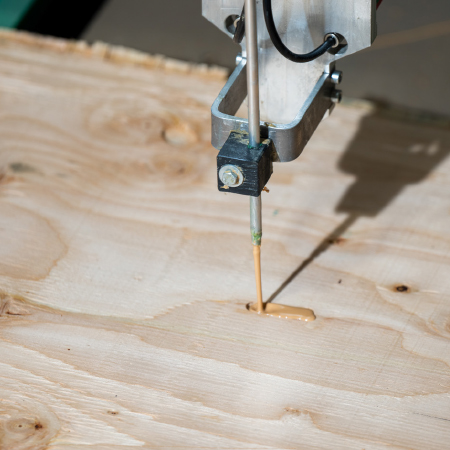
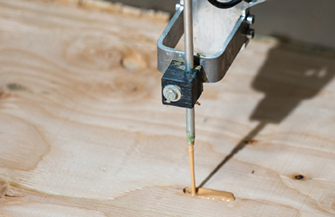
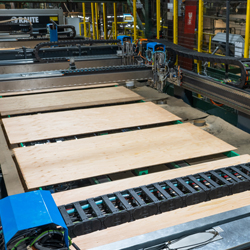
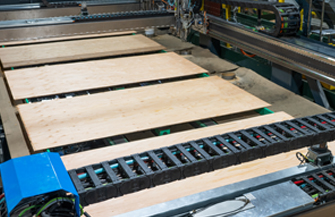
Plywood Patch Line Automation
In 2022, we installed an automated plywood panel repair system in St. Maries, Idaho. Previously, the plywood plant relied on two patch lines staffed by a team of up to 12 Team Members. The operators identified panel flaws, routed out defects, and filled them with patch compound using applicator guns. The manual process used patch compound inefficiently, was inconsistent, and the physically demanding nature of panel repair work contributed to repetitive motion injuries.
The automated panel repair system utilizes robotics to reduce waste and increase efficiency of the panel repair and patching process. Patch compound waste was reduced by over 90%, resulting in a significant reduction in chemical costs. Safety was also improved by reducing wood debris from routing on the manual line, as the new system routes the wood debris into a suction system and eliminates manual routing. This also reduced fire risk.
Working conditions were enhanced with the new line by eliminating fugitive dust and physically demanding manual labor that placed repetitive stress on hands, wrists, and shoulders. The majority of existing Team Members on the patch line were transitioned to other positions in the facility and Team Members remaining on the new line were trained in optimization and robotics.
The automated panel repair system results in higher product quality for plywood by utilizing optimization to determine and quantify the measurement of each panel and its defects. The system addresses each defect and repairs it to the exact size. In addition, there is an increase in productivity as a result of less human error and lower reruns for missed panel defects.
The installation of the robotics line was completed by our Team Members including millwrights, carpenters, and electricians. This resulted in on-site training and development of team members operating and maintaining the robotic equipment.
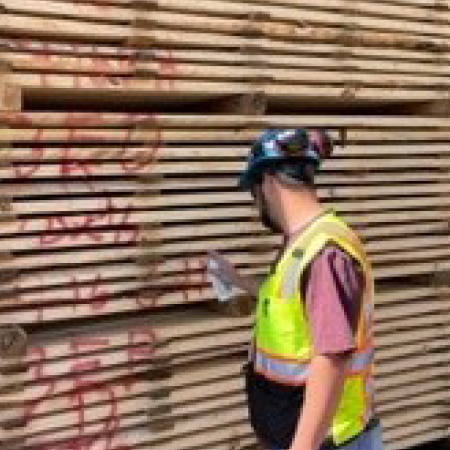
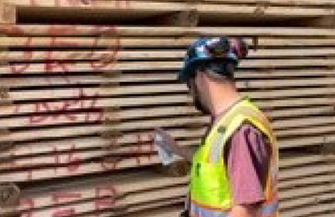
Waste Reduction Efforts
Hazardous waste generated at our facilities consists of the drained contents of spent aerosol cans and amounted to a total of 367 pounds in 2022. The final disposal method for this waste is done by a licensed third-party treatment and disposal facility and involves refining the waste liquid to recover useable solvents prior to combusting for energy recovery. The steel aerosol cans are recycled after they are emptied.
The Ola, Arkansas wood products facility undertook an initiative to eliminate this waste. The areas using aerosol were identified including spray painting lumber for marking before drying in the kilns, spray paint for marking maintenance work, and the use of non-chlorinated aerosol in degreasing activities.
The aerosol used at the kilns was converted to a handheld compressor air sprayer that can be filled with food grade coloring. An isolated room was allocated for rebuilding mill components with a compressed air sprayer or electric paint used for identification. A policy was also implemented to degrease material exclusively with compressed air.
The result is that Ola will nearly eliminate aerosol cans. Suppliers have been asked to provide bulk raw penetrating oils and cleaners in their place and training continues surrounding the proper techniques for filling the new handheld compressed air tanks.


